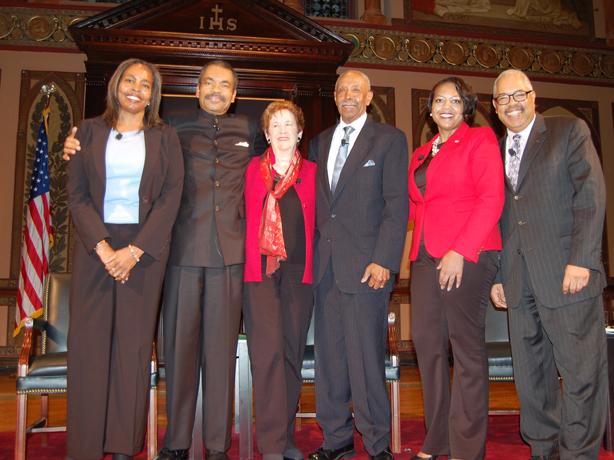Georgetown’s Black History Lives Anew at Gaston Hall
By • March 16, 2016 0 807

The evening of Feb. 24 began with winds, thunder and flooding, as participants made their way to Georgetown University’s Gaston Hall for a discussion of the historic black community in Georgetown, marking the 25th anniversary of the ground-breaking book “Black Georgetown Remembered,” published by the university in 1991. But by the time the event ended, the sky had become clear and blue, illuminated by a near-full moon.
“Black Georgetown Remembered,” reissued this year, put black Georgetowners back on the map. Originally spurred by the university’s bicentennial celebration in 1989, the book tells the story of black Georgetown from the perspective of those who remembered a neighborhood that included many more African Americans than in recent decades.
Moderated by Georgetown professor Maurice Jackson, the panel on stage included the book’s co-authors Valerie Babb and Kathleen Lesko, joined by black Georgetowners Vernon Ricks, Monica Roache and Neville Waters.
“Once a Georgetowner, always a Georgetowner” was a phrase heard in a brief film shown to the audience and spoken by a panelist or two. They meant the black past and present. Eva Calloway was shown in the film, saying that her part of Georgetown “had that love” of family, neighbors and business owners.
During the discussion, Babb brought up the memory of Raymond “Pebbles” Medley, who lived at the Jesuit community from an early age and was well known around campus, to students and teachers alike. She gave him credit for sparking an interest in Georgetown’s black history. Lesko noted that the book was “a transformative project.”
Babb also asked about the cost of changes to a community, noting that Georgetown seems more and more exclusive.
The older Ricks, who was born across from Rose Park, recalled a happy childhood where everything was available in town and the ice man, the coal man and the watermelon man made their rounds. He pulled no punches, calling the exodus of blacks from Georgetown “deportation or gentrification.”
Roache, a fifth-generation Georgetowner, spoke next of how much Georgetown has changed in just the last 25 years. As the newest advisory neighborhood commissioner, she asked, “What can I do to continue the legacy?” Roache asked those black Georgetowners, past or present, in the audience to stand and take a bow.
Waters, who has lived on P Street and now lives in the same place where his father was born and died, recalled the service workers, such as the knife sharpener, who came every Saturday, dinging his bell. One day, he did not hear the bell and knew the man had died or gone away. He said, “We were proud to be Georgetowners,” adding that he went to Georgetown University, too, and was “proud to be a Hoya.”

